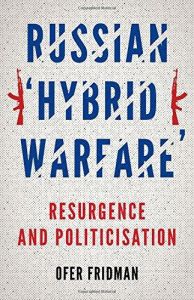Join getAbstract to access the summary!

Join getAbstract to access the summary!
Ofer Fridman
Russian “Hybrid Warfare”
Resurgence and Politicization
Hurst Publishers, 2018
What's inside?
Is it war or just hard-nosed politics? The answer depends on who you ask.
Recommendation
Russia captured the world’s attention in 2014 with its land grab in Crimea, and again, in 2016, when Russian sabotage just might have swayed America’s tight presidential race. According to scholar Ofer Fridman, such events illustrate that the world has entered a new era of warfare. In this shadowy new realm, warfare is less about body counts and more about the tough-to-quantify aims of fomenting conflict and gaining influence. This dense academic tome focuses on the theory behind modern “hybrid” warfare – a topic that promises to shape geopolitics for years to come.
Summary
About the Author
Ofer Fridman is director of operations at the King’s Centre for Strategic Communications and a research fellow at the Department of War Studies, King’s College London.
















Comment on this summary